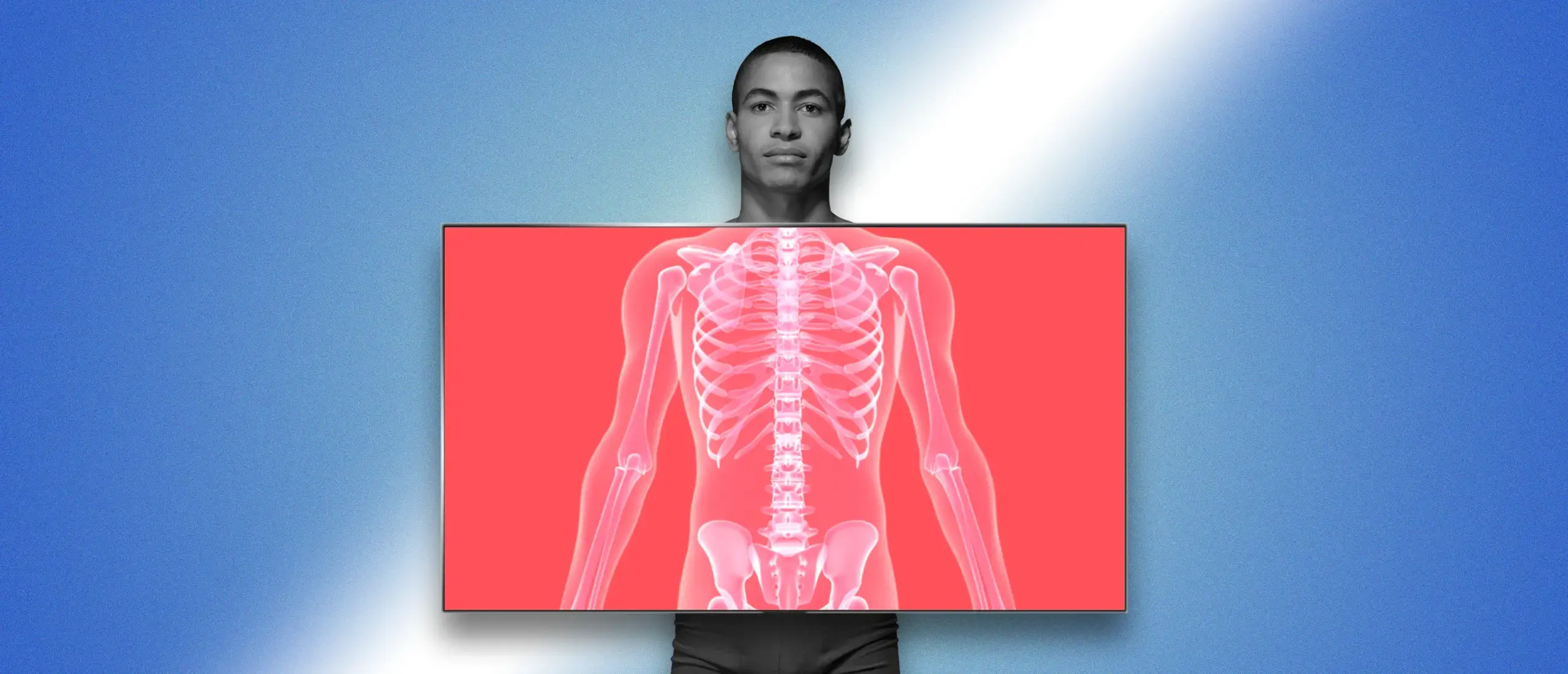The Latest Longevity Test Is an Old-School DEXA Scan
- By Rebekah Harding
- December 11, 2023
From full-body preventative MRIs, next-gen biological age assessments, and 100+ biomarker longevity tests flooding your feeds, it’s hard to decipher which are worth the splurge. But longevity doctor and podcast host Peter Attia, M.D., says there’s one old-school test that everyone should consider: the DEXA scan.
The full-body X-ray assesses bone density and body composition, such as body fat and muscle mass—and it’s been an annual part of Attia’s longevity protocol for over a decade.
What Is a DEXA Scan?
A DEXA scan gauges your body composition more effectively than your fancy scale that calculates body-fat percentage or a traditional body mass index (BMI) calculation, which is only based on your height and weight (1).
“BMI is useful for looking at trends in the population level when other measurements are not available,” Attia writes on The Drive blog. “But this metric is limited when applied to individuals because it does not account for variations in muscle mass, bone density, or fat distribution.”
For example, a bodybuilder with very little body fat and someone who is overweight could have the same height and weight. Their BMIs would be the same. However, they may not share the same overall health.
“You just have to know this data,” Attia says of the information a DEXA delivers on a recent episode of The Drive podcast. To get an accurate picture of your overall wellness, “you have to know your bone mineral density, how much visceral fat you have, and how much muscle mass you have.”
DEXA Scans and Longevity
DEXA scans have been used for ages to monitor disease progress—but its benefit has changed as more otherwise healthy people are interested in Medicine 3.0, or proactive, preventative care. These are the longevity-supporting insights you’ll get from a DEXA scan.
Bone mineral density
Many people don’t know they have osteoporosis—an age-related weakening of your bones—until they take a tumble and suffer a fracture. But the condition is surprisingly common, according to the Bone Health & Osteoporosis Foundation (BHOF).
One in two women, and one in four men, will break a bone due to osteoporosis in their lifetime—and the BHOF estimates that 54 million American adults over 50 are currently at risk of a break from osteoporosis (2).
Breaking a bone has major implications for your longevity as you age. For adults over 60, a fracture could rob you of one to seven years of your life, according to a 2023 study in the journal Epidemiology and Global Health (3).
The good news? The earlier you catch low bone density the better your outcomes will be (4).
If your DEXA scan shows that you are at risk for osteoporosis, your doctor may recommend taking bone-healthy supplements like vitamin D and calcium, hormone replacement therapy, or other osteoporosis treatments.
Visceral fat
A DEXA scan calculates your percentage of two types of fat: subcutaneous and visceral. Subcutaneous fat lives right under your skin. It’s the kind you can poke or see immediate changes in when you gain or lose weight. Visceral fat is sneakier, and can be more dangerous.
Visceral fat is the hard fat that occupies the space around your abs and important organs like your liver, kidney, and intestines. While it’s important to have some visceral fat to protect your organs, too much puts you at risk of lifespan-shortening conditions like diabetes, stroke, and heart disease (5).
Luckily, visceral fat is actually easier to lose than subcutaneous, per the Cleveland Clinic. If your DEXA shows that you have a high percentage of visceral fat, your doctor may recommend that you focus on eating a balanced diet and increasing your exercise.
Muscle mass
A DEXA scan calculates how much muscle mass you have: a key indicator for longevity. Having enough lean muscle mass can help control your glucose levels and stave off insulin resistance and type 2 diabetes—conditions that can shorten your lifespan (6).
But your muscle mass naturally declines about three to eight percent per year after age 30—and the older you get, the faster it decreases (7).
“Muscle mass is a great integrator of exercise and strength,” Attia says. However, it’s not just the muscle mass that boosts your longevity —it’s what you do to build it
“Muscle mass and strength are not equivalent. When head-to-head, strength beats muscle mass as a predictor of lifespan,” Attia explains. “The work that goes into that is the secret sauce. It’s what you have to do to get said muscle mass and what that muscle mass will then do vis-a-vis metabolic function.”
To boost muscle mass and strength quick, The Edge fitness & nutrition editor and personal trainer Sydney Bueckert, NASM CPT, CES, FNS, GPT, recommends this simple protocol:
- Start resistance training: You don’t have to do a ton to see changes. Try to hit all major muscle groups at least two times a week.
- Eat enough protein: In general, 1 gram of protein per pound of bodyweight is a great place to start. But as you notch up your sessions in the gym, you might want to add more. Keep an eye on your numbers and adjust as needed.
- Eat enough in general: Carbs and fats also play an important role in performance and recovery, so if you aren’t eating enough, your body will naturally shift towards breaking down muscle for energy.
“Stay consistent with the above three things, and you’ll see your muscle mass slowly start to tick up,” Bueckert says. “This isn’t something that happens overnight, and there’s no magic pill.”
How Can I Get a DEXA Scan?
Your GP will most likely order a DEXA scan if you have risk factors for osteoporosis such as extremely low body weight, frequent fractures, or if you have lost more than a half inch of height in a year (8).
Most insurance plans only cover this scan once every 24 months—and only if deemed medically necessary (9). So, if you’re planning to request one as part of your longevity protocol, expect to shell out some cash. A DEXA scan can set you back upwards of $1,000 if you’re paying out-of-pocket.
To find a DEXA provider near you, use this scan locator.
References
1. Shepherd, et al (2017). Body Composition by DXA.
2. BHOF. Osteoporosis Fast Facts.
3. Tran, et al (2023). ‘Skeletal Age’ for mapping the impact of fracture on mortality.
4. Rinaldi, et al (2021). The Early Detection of Osteoporosis in a Cohort of Healthcare Workers: Is There Room for a Screening Program?
5. Elffers, et al (2017). Body fat distribution, in particular visceral fat, is associated with cardiometabolic risk factors in obese women.
6. Lee, et al (2017). Resistance Training for Glycemic Control, Muscular Strength, and Lean Body Mass in Old Type 2 Diabetic Patients: A Meta-Analysis.
7. Volpi, et al (2010). Muscle tissue changes with aging.
8. MedlinePlus. Bone Density Scan.
9. Medicare. Bone mass measurements.












